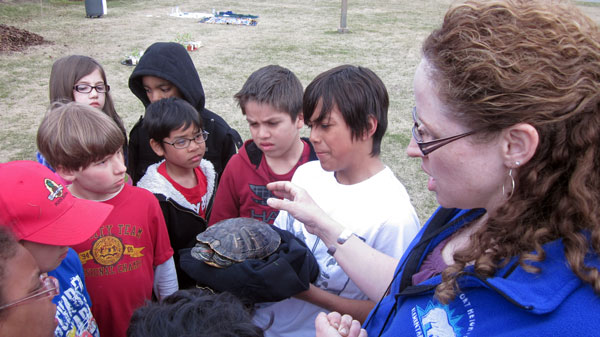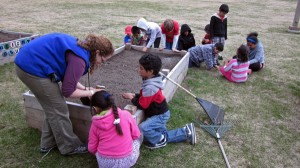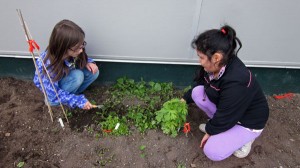
Normally, students in the Anchorage School District would be starting summer school in the next week or two, but funding cuts have canceled the program for the first time in recent memory. The cuts will impact struggling students most — especially immigrant, refugee and other students learning English.
The stories in this series were produced through a fellowship from the Institute for Justice & Journalism.
During one of the last days of school, a group of second graders drop carrot seeds into neat rows in the raised beds of the garden at Airport Heights Elementary.
Usually, kids who need extra instruction can continue at Airport Heights through summer school. Second grade teacher Marcy Jasper, who’s leading the gardening, says she’s frustrated that the program has been canceled.

“It makes a huge difference for kiddos who need the extra support,” Jasper said. “And I’ve wanted them to extend the program so it’s very frustrating that it’s been pulled back instead of extended.”
District wide, more than 6,000 students will do without summer school this year. Mike Webb, the Principal at Airport Heights says canceling summer school will undoubtedly hurt students, especially young kids who are learning English. He says they usually forget stuff over the summer. And if they’re not speaking English while school’s out, it’s worse. He’s afraid it could really set kids learning English behind. And that can add up.
“If they’re not getting it in second and third grade then by the time they get to fifth and sixth grade we’re still trying to teach them what should have been done 2 or 3 years ago,” Webb said. “So, we’re swimming upstream so to speak, when that happens.”
Nobody could say exactly how many years summer school has been an option, but administrators agree it’s been around in one form or another for more than a decade. Anticipating budget cuts the Anchorage School Board de-funded the $2.8 million program for grades K-12, last year. Superintendent Ed Graff says the district made a tough choice.
“We’ve struggled with you know how you allocate resources,” Graff said. “Do you spend those resources during the regular school year or do you take from that allocation from the regular school year and hold that until the summer months?”
“And I think we felt we needed to, with the declining revenue that we had, use those resources to support the kids during the school year.”

But parents like Maribel Reyna, who immigrated to the United States from Mexico are worried their kids will lose their English over the summer. Reyna has three kids at Airport Heights, a kindergartner, second grader and a third grader. The family doesn’t speak English at home. She says summer school has been critical for her older children, who attended for five years. They now speak English fluently, she says, and are thriving in Middle School.
“I am concerned about my younger kids not attending summer school because I have seen the huge improvement they have made during the previous years when he others attended,” Reyna said. “And I like the fact that they don’t get disconnected from the school.”
Reyna says she plans to enroll her kids in a free church program over the summer, hoping that they’ll get to practice English there. At Airport Heights, students speak around a dozen different languages and about one third of students are learning English as a second language. Test scores have been low at the school, but they are slowly improving. Educators worry that without summer school those gains could be lost.
Majalisa Pratt has been an English language teacher for the district for more than a decade. Private summer programs, she says, are often costly and out of reach for most of the families she serves.
“My families are Title 1 families,” Pratt said. “They can’t afford to pay for something.”
“So, a lot of the camps you could go to, Campfire – things like that, that have enrichment programs, they can’t afford it.”
Pratt notes that free church and community programs do not have the academic focus of summer school and she doesn’t think they can actually take up the slack left by the district.
Second grade teacher Marcy Jasper says she’s bracing for the impact.
“This will be my first year where I know those kids aren’t getting the extra support so I guess I’m going to see the loss of English over the summer,” Jasper said. “So I guess next fall I can have more to say on that.”
In addition, teachers and administrators at Airport Heights say they’re nervous about more possible cuts to programs that support English language learners in August, just before school starts.
The stories in this series were produced through a fellowship from the Institute for Justice & Journalism.
Daysha Eaton is a contributor with the Alaska Public Radio Network.
Daysha Eaton holds a B.A. from Evergreen State College, and a M.A. from the University of Southern California. Daysha got her start in radio at Seattle public radio stations, KPLU and KUOW. Before coming to KBBI, she was the News Director at KYUK in Bethel. She has also worked as the Southcentral Reporter for KSKA in Anchorage.
Daysha's work has appeared on NPR's "Morning Edition" and "All Things Considered", PRI's "The World" and "National Native News". She's happy to take assignments, and to get news tips, which are best sent via email.
Daysha became a journalist because she believes in the power of storytelling. Stories connect us and they help us make sense of our world. They shed light on injustice and they comfort us in troubled times. She got into public broadcasting because it seems to fulfill the intention of the 4th Estate and to most effectively apply the freedom of the press granted to us through the Constitution. She feels that public radio has a special way of moving people emotionally through sound, taking them to remote places, introducing them to people they would not otherwise meet and compelling them to think about issues they might ordinarily overlook.




